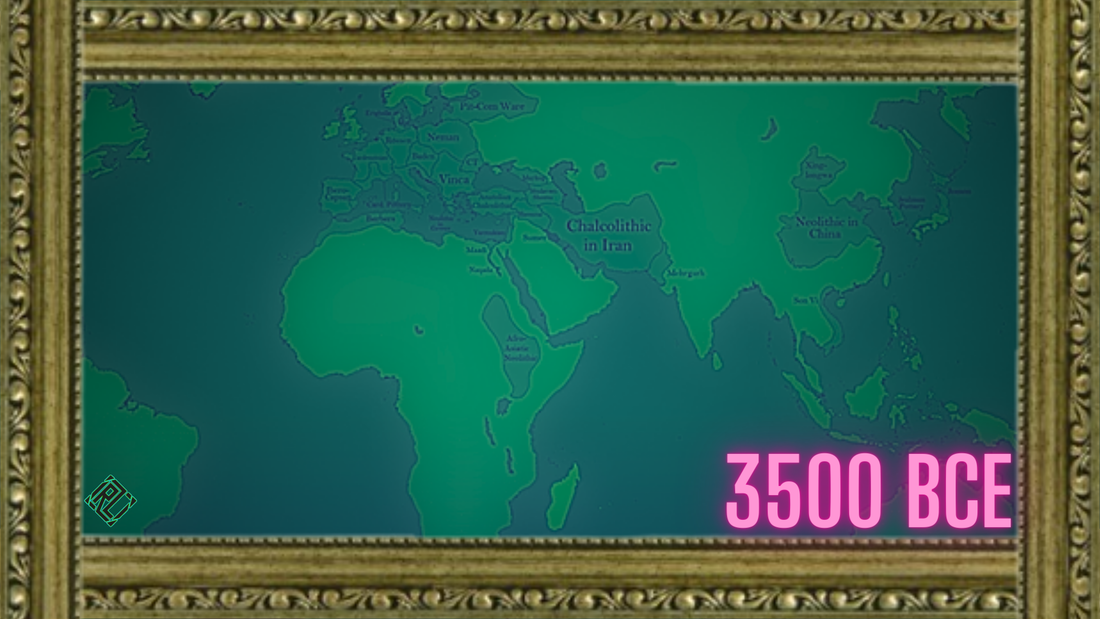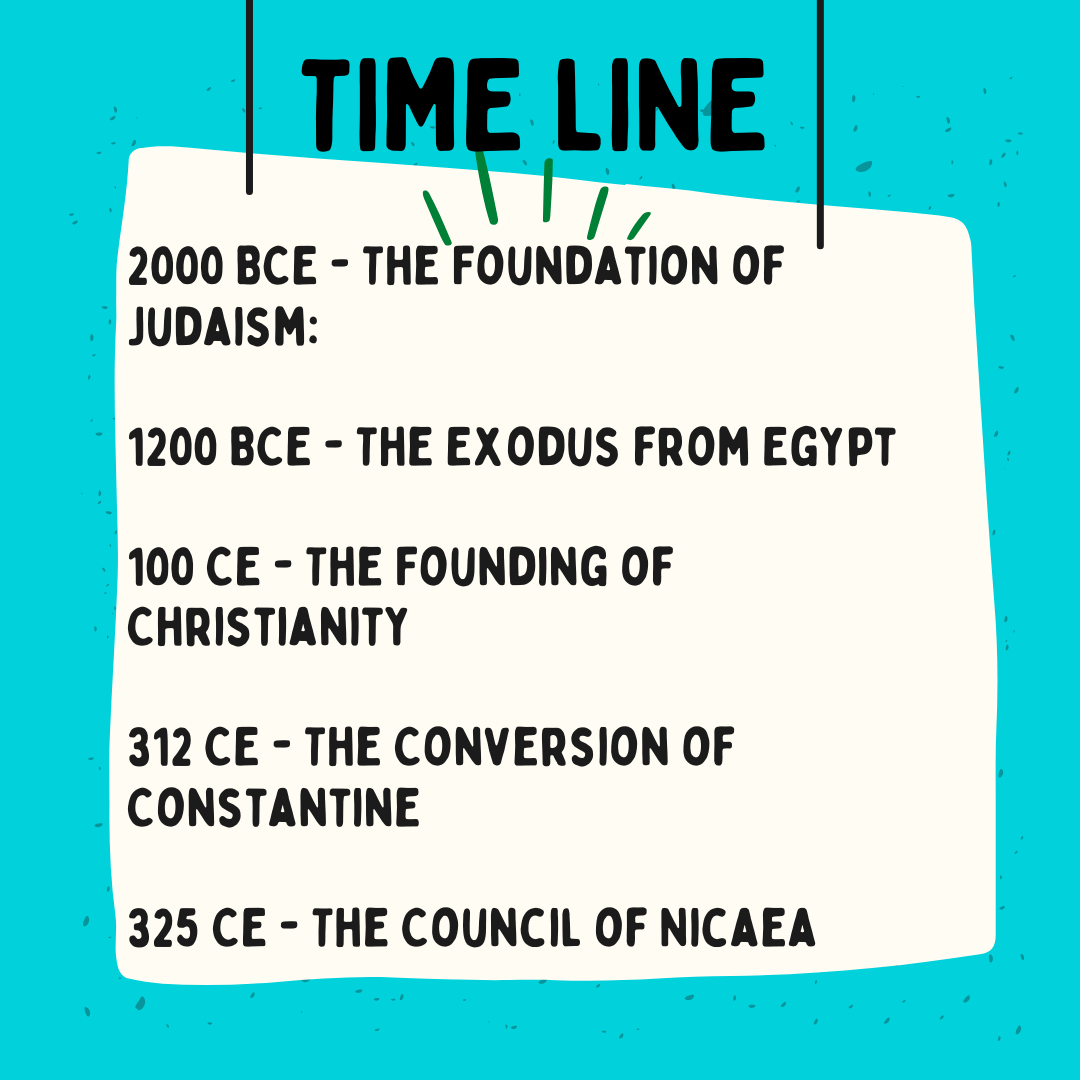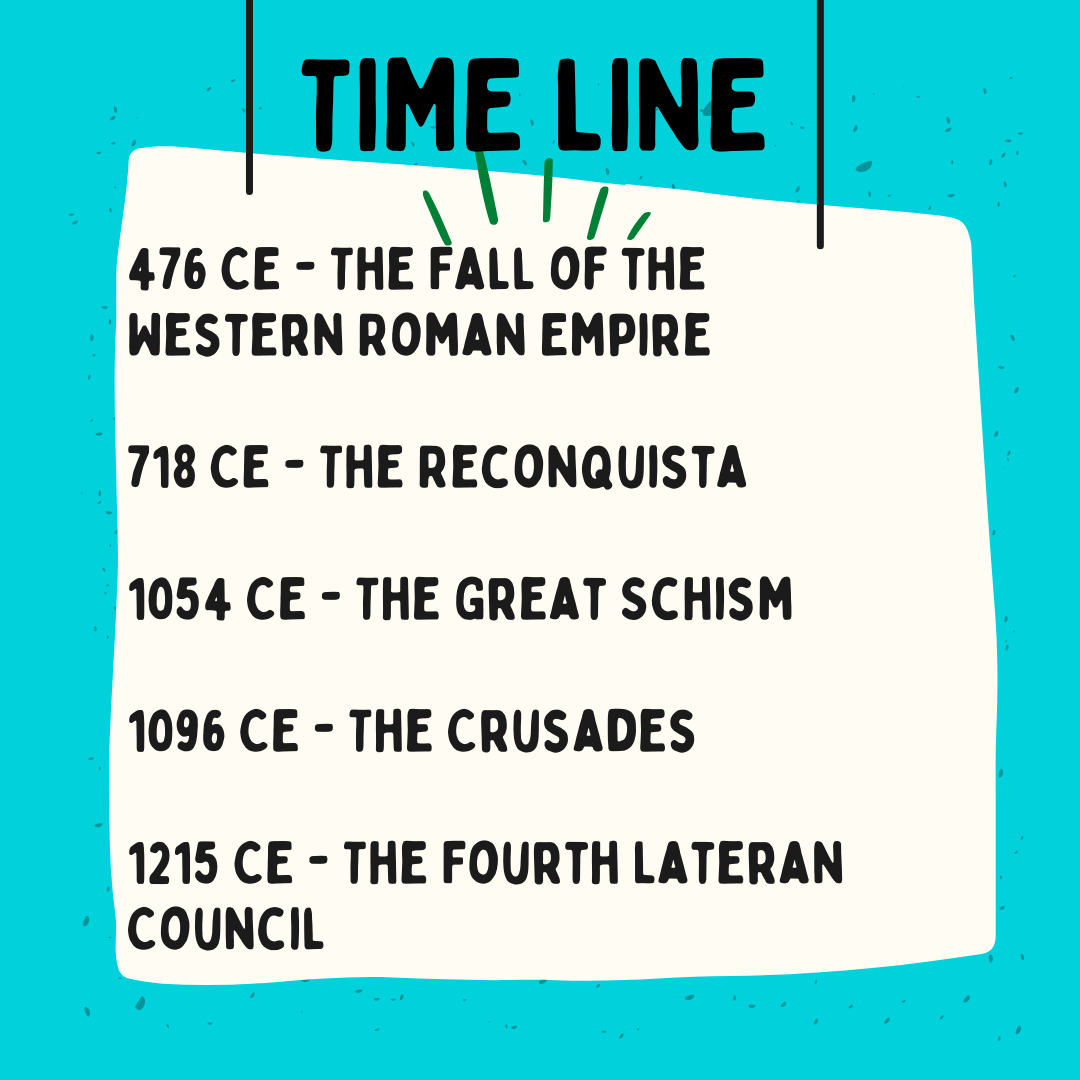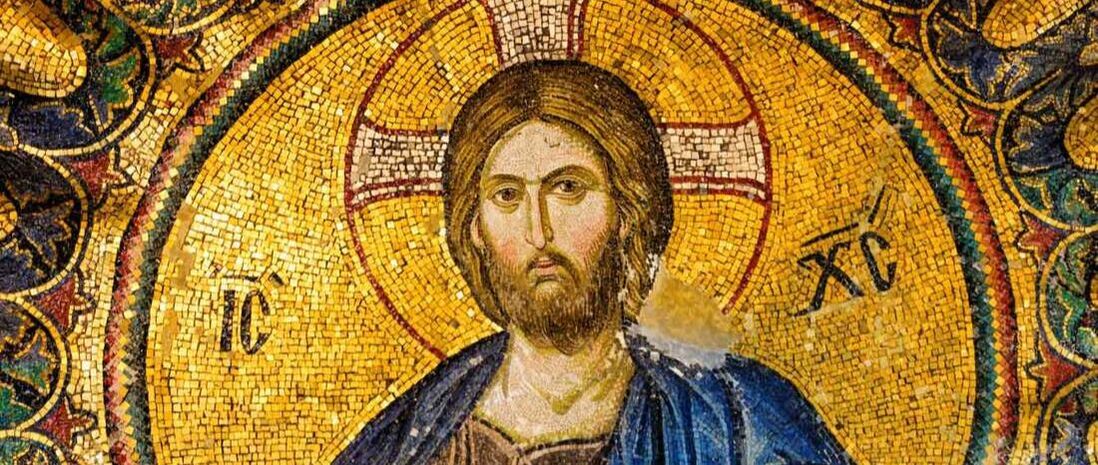Module Three: Divine Designs
In a universe where Zeus is more than just a storybook character but a key player in town meetings and festivals, it is not just about fun but also about thanking the higher-ups; Ancient Greece was more than just togas and love for olives. It was a place packed with gods, goddesses, and a big helping of pride.
The Olympics? Yes, they had sports like discus and wrestling, but they were also a grand stage to show Zeus some love. Imagine winning a gold and a nod from the king of the heavens. Talk about a high-five from above!
But I wasn’t all olive wreaths and heavenly nectar. There were drawbacks. If you weren’t on the right God's guest list and didn’t follow the rules, you were as welcome as a Spartan at a hug-a-thon. It was a cosmic game of tag where believers were" “t,” and non-believers were left out in the cold.
Fast-forward to medieval Europe, where the Church was not just for Sunday sermons; it held the keys to the kingdom. Kings did not just get a crown; they got the divine seal of approval. It was like the Pope hadGodd on speed dial and was nott afraid to dial.
Look at Charlemagne, for instance. He didn’t just want to be King of the Franks; he wanted the deluxe version. So, he buddied up with Pope Leo III, and bamHe’s Holy Roman Emperor with a fancy new title and a heap of divine street cred—Royal perks for divine networking.
Sure, it kept the peace, but it sparked some serious power battles. Popes and monarchs squaring off over who calls the shots. That’s like a holy tug-of-war with kingdoms at stake. Don’t overlook the brainy side of things, either. Monasteries were more than just monk hangouts; they were the Ivy Leagues of their day. Scholars weren’t just chatting about theology; they were wrestling with big questions, like faith vs. facts and whether the Earth was center stage.
There's Thomas Aquinas, the thinking man’s philosopher. He didn’t just take things on faith; he put reason through its paces. His Summa Theologica was a knockout punch to doubters and naysayers alike. Does faith meet reason? Make that faith with a sprinkle of logic.
But I wasn’t all lightbulb moments and big ideas. Dogma could be a real party pooper for science. Just ask Galileo, who found himself in hot water, for questioning the status quo. It turns out Earht wasn’t the universe’s VIP section, and the Church wasn't thrilled about playing second fiddle to the stars.
What’s the takeaway? Religion played a significant role in shaping the West, but it wasn’t always smooth sailing. It had its ups and downs, its victories and setbacks. Knowing its history is like having a compass for the soul. So, fasten your seatbeltIt It’s going to be an exciting journey.
THE RUNDOWN
QUESTIONS
The Olympics? Yes, they had sports like discus and wrestling, but they were also a grand stage to show Zeus some love. Imagine winning a gold and a nod from the king of the heavens. Talk about a high-five from above!
But I wasn’t all olive wreaths and heavenly nectar. There were drawbacks. If you weren’t on the right God's guest list and didn’t follow the rules, you were as welcome as a Spartan at a hug-a-thon. It was a cosmic game of tag where believers were" “t,” and non-believers were left out in the cold.
Fast-forward to medieval Europe, where the Church was not just for Sunday sermons; it held the keys to the kingdom. Kings did not just get a crown; they got the divine seal of approval. It was like the Pope hadGodd on speed dial and was nott afraid to dial.
Look at Charlemagne, for instance. He didn’t just want to be King of the Franks; he wanted the deluxe version. So, he buddied up with Pope Leo III, and bamHe’s Holy Roman Emperor with a fancy new title and a heap of divine street cred—Royal perks for divine networking.
Sure, it kept the peace, but it sparked some serious power battles. Popes and monarchs squaring off over who calls the shots. That’s like a holy tug-of-war with kingdoms at stake. Don’t overlook the brainy side of things, either. Monasteries were more than just monk hangouts; they were the Ivy Leagues of their day. Scholars weren’t just chatting about theology; they were wrestling with big questions, like faith vs. facts and whether the Earth was center stage.
There's Thomas Aquinas, the thinking man’s philosopher. He didn’t just take things on faith; he put reason through its paces. His Summa Theologica was a knockout punch to doubters and naysayers alike. Does faith meet reason? Make that faith with a sprinkle of logic.
But I wasn’t all lightbulb moments and big ideas. Dogma could be a real party pooper for science. Just ask Galileo, who found himself in hot water, for questioning the status quo. It turns out Earht wasn’t the universe’s VIP section, and the Church wasn't thrilled about playing second fiddle to the stars.
What’s the takeaway? Religion played a significant role in shaping the West, but it wasn’t always smooth sailing. It had its ups and downs, its victories and setbacks. Knowing its history is like having a compass for the soul. So, fasten your seatbeltIt It’s going to be an exciting journey.
THE RUNDOWN
- Religion helped unite people in ancient Greece, like during the Olympic Games, making them feel part of a shared culture.
- In medieval Europe, the Church gave kings power by saying they were chosen by God, which sometimes caused conflicts with rulers.
- Places like the University of Paris became centers for learning where religion and science were studied together.
- Famous art and stories from before 1500, like Dante's "Divine Comedy," still influence Western culture today.
- Understanding old religions helps us respect and understand different beliefs around the world.
- Many of our ideas about what's right and wrong come from these old religious teachings.
QUESTIONS
- How do you think religion helped people in ancient Greece feel connected to each other? Can you think of any modern events that have a similar effect?
- Why do you think it's important for us to understand and respect different religious beliefs from around the world? Can you think of any examples of this in your community?
- How do you think old religious teachings have influenced our ideas about what's right and wrong? Can you find any examples of this in laws or rules you know?
#3 Credit is Important
History is woven with the intricate threads of triumphs and tragedies, acts of heroism and unspeakable horrors, and the occasional individual who stumbled unwittingly into greatness while pursuing mundane objectives like locating misplaced car keys. It constitutes a tumultuous journey through the annals of time, where participants either secure their names in the eternal record or, more frequently, fade into obscurity, akin to the hazy memories of regrettable choices from the previous night. Let's delve into the imperative principle of ascribing due recognition. It mirrors the ethos of history – treating others' contributions with the same respect one would desire for their own. History often resembles a tabloid column composed by a discerning neighbor privy to everyone's affairs yet prone to misrepresenting the finer details.
Consider the Civil Rights Movement, an illustration of Martin Luther King Jr. basking in the spotlight like a Broadway diva. However, behind the scenes, an ensemble cast of predominantly female unsung heroes toiled tirelessly for justice. It's reminiscent of an Oscars ceremony, where everyone anticipates their moment, but the industry consistently neglects distributing well-deserved accolades. Then there's the Tuskegee Syphilis Study, an unsettling narrative of individuals, assuming they were enrolling in a health spa, unwittingly becoming subjects of an unethical experiment. If only their involuntary sacrifice garnered the acknowledgment it warranted, perhaps they would have preferred a spa day.
Now, let's scrutinize the convoluted DNA storyline. James Watson and Francis Crick bask in the glory of the Nobel Prize for unraveling the DNA structure. Yet, the vital contribution of Rosalind Franklin remains obscured in the background, akin to an unsung hero in a rock band, diligently executing laborious tasks while the leads hog the limelight. The failure to accord proper credit transcends mere historical oversights; it represents a broader societal lapse. It's akin to the moment you forget a friend's birthday, but on a global scale, with ramifications far weightier and fewer cake remnants.
Beyond the aversion to replicating the missteps of our historical forebears, it is high time we acknowledged the diversity inherent in the attribution of credit. It is time to peruse the closing credits and encounter a roster as diverse as a music festival lineup. Granting due credit is not solely a historical imperative but an ethical one. It involves recognizing that everyone played a role in this intricate, convoluted narrative, even those relegated to the sidelines without a single line.
In conclusion, let us refrain from emulating the individuals who chronicle history as if crafting a high school yearbook, selectively highlighting only the cool kids. Instead, let us accord credit where it rightfully belongs, glean lessons from the epic failures of the past, and forge a future that transcends the trappings of a historical blooper reel, aspiring to be an opulent masterpiece worthy of acclaim.
RUNDOWN
STATE OF THE WORLD
Consider the Civil Rights Movement, an illustration of Martin Luther King Jr. basking in the spotlight like a Broadway diva. However, behind the scenes, an ensemble cast of predominantly female unsung heroes toiled tirelessly for justice. It's reminiscent of an Oscars ceremony, where everyone anticipates their moment, but the industry consistently neglects distributing well-deserved accolades. Then there's the Tuskegee Syphilis Study, an unsettling narrative of individuals, assuming they were enrolling in a health spa, unwittingly becoming subjects of an unethical experiment. If only their involuntary sacrifice garnered the acknowledgment it warranted, perhaps they would have preferred a spa day.
Now, let's scrutinize the convoluted DNA storyline. James Watson and Francis Crick bask in the glory of the Nobel Prize for unraveling the DNA structure. Yet, the vital contribution of Rosalind Franklin remains obscured in the background, akin to an unsung hero in a rock band, diligently executing laborious tasks while the leads hog the limelight. The failure to accord proper credit transcends mere historical oversights; it represents a broader societal lapse. It's akin to the moment you forget a friend's birthday, but on a global scale, with ramifications far weightier and fewer cake remnants.
Beyond the aversion to replicating the missteps of our historical forebears, it is high time we acknowledged the diversity inherent in the attribution of credit. It is time to peruse the closing credits and encounter a roster as diverse as a music festival lineup. Granting due credit is not solely a historical imperative but an ethical one. It involves recognizing that everyone played a role in this intricate, convoluted narrative, even those relegated to the sidelines without a single line.
In conclusion, let us refrain from emulating the individuals who chronicle history as if crafting a high school yearbook, selectively highlighting only the cool kids. Instead, let us accord credit where it rightfully belongs, glean lessons from the epic failures of the past, and forge a future that transcends the trappings of a historical blooper reel, aspiring to be an opulent masterpiece worthy of acclaim.
RUNDOWN
- Proper credit in history is crucial for presenting accurate events, acknowledging contributions, and preventing distorted historical narratives.
- Recognizing diverse contributions, such as those in the Civil Rights Movement, ensures a more inclusive view of the past beyond prominent figures.
- Failure to give proper credit can perpetuate historical inaccuracies and marginalize certain groups, as seen in the Tuskegee Syphilis Study.
- Rosalind Franklin's case in the discovery of DNA structure underscores the importance of crediting all contributors for a comprehensive understanding.
- Studying the subject today promotes ethical considerations, encouraging acknowledgment of the impact of individuals and groups in historical research.
- Understanding the consequences of historical misattribution shapes efforts to create a more just and inclusive future, emphasizing fairness and equity in recording and sharing history.
STATE OF THE WORLD
3500 BCE, the era of cave doodles and budding writing skills! Imagine the Sumerians in Mesopotamia crafting cuneiform and unintentionally becoming ancient influencers. Meanwhile, Egypt mastered the art of Nile-delivered life hacks and laid the groundwork for future pyramid schemes. Over in the Indus Valley, they were the Silicon Valley of their time. Europe was transitioning to farming and giving Stonehenge a whirl. Despite tech advancements like writing and agriculture, they faced nature’s curveballs and resource squabbles. Human history is a mix of innovation, drama, and the eternal quest for validation, whether on clay tablets or Instagram posts. We’ve come a long way, but we’re still piecing it together, one meme at a time.
HIGHLIGHTS
We've got some fine classroom lectures coming your way, all courtesy of the RPTM podcast. These lectures will take you on a wild ride through history, exploring everything from ancient civilizations and epic battles to scientific breakthroughs and artistic revolutions. The podcast will guide you through each lecture with its no-nonsense, straight-talking style, using various sources to give you the lowdown on each topic. You won't find any fancy-pants jargon or convoluted theories here, just plain and straightforward explanations anyone can understand. So sit back and prepare to soak up some knowledge.
LECTURES
LECTURES
- UNDER CONSTRUCTION!
The Reading section—a realm where our aspirations of enlightenment often clash with the harsh realities of procrastination and the desperate reliance on Google. We soldier on through dense texts, promised 'broadening perspectives' but often wrestling with existential dread and academic pressure. With a healthy dose of sarcasm and a strong cup of coffee, I'll be your guide on this wild journey from dusty tomes to the murky depths of postmodernism. In the midst of all the pretentious prose, there's a glimmer of insight: we're all in this together, united in our struggle to survive without losing our sanity.
READING
This class utilizes the following textbook:
Sherman, Dennis, and Joyce Salisbury. The West in the World. 5th ed. McGraw Hill, 2013.
In the whirlwind of academia, where tweed jackets and discussions about the best coffee spot reign, Joyce Salisbury and Dennis Sherman stand out as the rebels of historical scholarship. Armed with Salisbury's Ph.D. in medieval history from Rutgers University and Sherman's academic journey from UC Berkeley to the University of Michigan, they challenge the conventional norms with their scholarly prowess and irreverent wit. Salisbury fearlessly delves into ancient violence with works like "The Blood of Martyrs" and uncovers forgotten tales of resilience in "The Encyclopedia of Women in the Ancient World." Meanwhile, Sherman, akin to an academic Indiana Jones, roams the globe contemplating French history in Parisian cafes and making history accessible with titles like "A Short History of Western Civilization." Together, they disrupt the ivory tower with their unapologetic approach and thirst for asking the tough questions.
As a dynamic duo, Salisbury and Sherman defy the stereotype of the stuffy historian. Their partnership merges Salisbury's pen, mightier than Excalibur itself, with Sherman's knack for weaving accessible narratives. They're not just scholars but cultural provocateurs challenging the status quo. So, here's to raising a glass (or a quill) to these academic renegades, who breathe life into the dusty corridors of historical scholarship with their relentless curiosity and scholarly swagger.
RUNDOWN
READING
- Chapter 3. The Poleis Become Cosmopolitan: The Hellenistic World, 336-150 B.C.E.
This class utilizes the following textbook:
Sherman, Dennis, and Joyce Salisbury. The West in the World. 5th ed. McGraw Hill, 2013.
In the whirlwind of academia, where tweed jackets and discussions about the best coffee spot reign, Joyce Salisbury and Dennis Sherman stand out as the rebels of historical scholarship. Armed with Salisbury's Ph.D. in medieval history from Rutgers University and Sherman's academic journey from UC Berkeley to the University of Michigan, they challenge the conventional norms with their scholarly prowess and irreverent wit. Salisbury fearlessly delves into ancient violence with works like "The Blood of Martyrs" and uncovers forgotten tales of resilience in "The Encyclopedia of Women in the Ancient World." Meanwhile, Sherman, akin to an academic Indiana Jones, roams the globe contemplating French history in Parisian cafes and making history accessible with titles like "A Short History of Western Civilization." Together, they disrupt the ivory tower with their unapologetic approach and thirst for asking the tough questions.
As a dynamic duo, Salisbury and Sherman defy the stereotype of the stuffy historian. Their partnership merges Salisbury's pen, mightier than Excalibur itself, with Sherman's knack for weaving accessible narratives. They're not just scholars but cultural provocateurs challenging the status quo. So, here's to raising a glass (or a quill) to these academic renegades, who breathe life into the dusty corridors of historical scholarship with their relentless curiosity and scholarly swagger.
RUNDOWN
- Greece under Alexander the Great conquered Egypt and the Asian part of the Persian Empire.
- This led to a unique mix of Greek, Egyptian, and Persian cultures.
- Greek rulers were established in cities from the Mediterranean to India.
- Greek civilization spread, but it also changed the cultures it touched.
- Political and cultural centers shifted from Greek city-states to cosmopolitan areas.
- People from different parts of the world mingled in these new centers.
- Some people benefited from this cosmopolitan life, while others became very poor.
- Some embraced the blending of cultures, while others rejected it.
- Macedonian kings Philip and Alexander changed Greek city-states permanently.
- Despite endless wars for land and power, kings supported culture and learning.
- Scientists, artisans, and scholars made significant advances during this time.
- However, a new force in the West was emerging, which would greatly affect Hellenistic civilizations.
Howard Zinn was a historian, writer, and political activist known for his critical analysis of American history. He is particularly well-known for his counter-narrative to traditional American history accounts and highlights marginalized groups' experiences and perspectives. Zinn's work is often associated with social history and is known for his Marxist and socialist views. Larry Schweikart is also a historian, but his work and perspective are often considered more conservative. Schweikart's work is often associated with military history, and he is known for his support of free-market economics and limited government. Overall, Zinn and Schweikart have different perspectives on various historical issues and events and may interpret historical events and phenomena differently. Occasionally, we will also look at Thaddeus Russell, a historian, author, and academic. Russell has written extensively on the history of social and cultural change, and his work focuses on how marginalized and oppressed groups have challenged and transformed mainstream culture. Russell is known for his unconventional and controversial ideas, and his work has been praised for its originality and provocative nature.
My classes utilize both Howard Zinn's A People's History of the United States and Larry Schweikart's Patriot's History of the United States, mostly in excerpts posted to the modules.
My classes utilize both Howard Zinn's A People's History of the United States and Larry Schweikart's Patriot's History of the United States, mostly in excerpts posted to the modules.

Zinn, A People's History of the United States
"...The need for slave control (In America) led to an ingenious device, paying poor whites-themselves so troublesome for two hundred years of southern history-to be overseers of black labor and therefore buffers for black hatred.
Religion was used for control. A book consulted by many planters was the Cotton Plantation Record and Account Book, which gave these instructions to overseers: 'You will find that an hour devoted every Sabbath morning to their moral and religious instruction would prove a
great aid to you in bringing about a better state of things amongst the Negroes...'
"...The need for slave control (In America) led to an ingenious device, paying poor whites-themselves so troublesome for two hundred years of southern history-to be overseers of black labor and therefore buffers for black hatred.
Religion was used for control. A book consulted by many planters was the Cotton Plantation Record and Account Book, which gave these instructions to overseers: 'You will find that an hour devoted every Sabbath morning to their moral and religious instruction would prove a
great aid to you in bringing about a better state of things amongst the Negroes...'

Larry Schweikart, A Patriot's History of the United States
"...By 1700, then, three major themes characterized the history of the early English colonies. First, religion played a crucial role in not only the search for liberty, but also in the institutions designed to ensure its continuation. From the Mayflower Compact to the Charter of Liberties, colonists saw a close connection between religious freedom and personal liberty. This fostered a multiplicity of denominations, which, at a time when people literally killed over small differences in the interpretation of scripture, 'made it necessary to seek a basis for political unity' outside the realm of religion..."
"...By 1700, then, three major themes characterized the history of the early English colonies. First, religion played a crucial role in not only the search for liberty, but also in the institutions designed to ensure its continuation. From the Mayflower Compact to the Charter of Liberties, colonists saw a close connection between religious freedom and personal liberty. This fostered a multiplicity of denominations, which, at a time when people literally killed over small differences in the interpretation of scripture, 'made it necessary to seek a basis for political unity' outside the realm of religion..."

Thaddeus Russell, A Renegade History of the United States
"... God forbid they could be simply and only "fun." Historians hostile to popular culture-who are far more numerous-dismiss it as part of the "culture of consumption" that was forced on the masses by advertisers, who were labeled by one historian as 'the captains of consciousness.' Though billions of Americans have gained real pleasure, radically improved their lives, and determined the production of goods by what economists call 'voting with one's feet,' nearly all histories of consumerism are negative. Allegedly 'progressive' scholars write as if they are unaware that bourgeois moralists of the nineteenth century were the first to criticize the 'base' desires and 'unseemly' spending habits of the masses."
"... God forbid they could be simply and only "fun." Historians hostile to popular culture-who are far more numerous-dismiss it as part of the "culture of consumption" that was forced on the masses by advertisers, who were labeled by one historian as 'the captains of consciousness.' Though billions of Americans have gained real pleasure, radically improved their lives, and determined the production of goods by what economists call 'voting with one's feet,' nearly all histories of consumerism are negative. Allegedly 'progressive' scholars write as if they are unaware that bourgeois moralists of the nineteenth century were the first to criticize the 'base' desires and 'unseemly' spending habits of the masses."
Religion, the ever-changing chameleon, always finding new colors to match our ever-shifting tastes. It's like that friend who claims to be equally passionate about Nietzsche and EDM. And who hasn't fallen for the allure of consumerism, only to realize they were binge-watching with Amazon Prime?
Ah, the Cotton Plantation Record and Account Book, the 19th-century equivalent of a "how-to" for pyramid schemes. "Overseers, when you're not doling out punishments, sprinkle in some religious talk. It keeps everyone calm!" It's almost like saying, "Sure, I'm holding you down, but have you tried deep breathing?"
Consumerism is our modern-day bible, where we're all devout followers of the More Stuff Church. Advertisers aren't just masters of persuasion but the "Buy Now, Regret Later" high priests. But remember the Protestant Reformation? Martin Luther, the first influencer, posted his 95 theses like a medieval subtweet. "Don't pay for forgiveness" was his way of saying, "Mute that Pope guy; he's too commercial."
Early colonists and their "passion" for religious freedom were like those who claim to embrace diversity, but only if it's sushi one day and tacos the next. Roger Williams, the rebel, founded Rhode Island, a 17th-century haven for those who found Puritans a bit too serious. "Rhode Island: Where we're only strict about being relaxed!"
Religion's like that lifelong friend who's always there, sometimes annoying, often insightful, and forever influencing us in the weirdest ways. The eccentric cousin at Western civilization's family gathering is reminiscing, "Remember when we had that whole burning-at-the-stake phase? Classic!"
The eternal tug-of-war of religion, balancing moral guidance with power struggles. As they say, "Great religious zeal often leads to great power... for oppressing others." Religion offered community, but also the Crusades, which were the world's most intense "getting to know you" events.
Here we are, still debating whether religion's our BFF or arch-nemesis. It's like every rom-com plot, but instead of choosing between two love interests, we're torn between enlightenment and holy conflicts. Navigating life's maze, we find religion, like life itself, is wonderfully messy. But it sure gives us something to chat about, whether it's over drinks or, you know, the occasional questionable trial.
THE RUNDOWN
QUESTIONS
Ah, the Cotton Plantation Record and Account Book, the 19th-century equivalent of a "how-to" for pyramid schemes. "Overseers, when you're not doling out punishments, sprinkle in some religious talk. It keeps everyone calm!" It's almost like saying, "Sure, I'm holding you down, but have you tried deep breathing?"
Consumerism is our modern-day bible, where we're all devout followers of the More Stuff Church. Advertisers aren't just masters of persuasion but the "Buy Now, Regret Later" high priests. But remember the Protestant Reformation? Martin Luther, the first influencer, posted his 95 theses like a medieval subtweet. "Don't pay for forgiveness" was his way of saying, "Mute that Pope guy; he's too commercial."
Early colonists and their "passion" for religious freedom were like those who claim to embrace diversity, but only if it's sushi one day and tacos the next. Roger Williams, the rebel, founded Rhode Island, a 17th-century haven for those who found Puritans a bit too serious. "Rhode Island: Where we're only strict about being relaxed!"
Religion's like that lifelong friend who's always there, sometimes annoying, often insightful, and forever influencing us in the weirdest ways. The eccentric cousin at Western civilization's family gathering is reminiscing, "Remember when we had that whole burning-at-the-stake phase? Classic!"
The eternal tug-of-war of religion, balancing moral guidance with power struggles. As they say, "Great religious zeal often leads to great power... for oppressing others." Religion offered community, but also the Crusades, which were the world's most intense "getting to know you" events.
Here we are, still debating whether religion's our BFF or arch-nemesis. It's like every rom-com plot, but instead of choosing between two love interests, we're torn between enlightenment and holy conflicts. Navigating life's maze, we find religion, like life itself, is wonderfully messy. But it sure gives us something to chat about, whether it's over drinks or, you know, the occasional questionable trial.
THE RUNDOWN
- Religion was used to control slaves in America by teaching them obedience and reinforcing power dynamics.
- Consumerism, influenced by advertising, has both empowered people through choice and been criticized for promoting materialism.
- Early English colonies valued religious freedom, seeing it as linked to personal liberty, but this also required political unity to prevent conflicts.
- Rhode Island was founded in 1636 as a haven for religious minorities, emphasizing separating church and state.
- Religion has offered moral guidance and built communities but has also justified power structures and caused conflicts.
- Studying religion before 1500 CE helps us understand how beliefs have shaped Western civilization, both positively and negatively.
QUESTIONS
- What are the positives and negatives of consumerism, especially in the context of mass advertising?
- In what ways has religion offered moral guidance and built communities throughout history, and how has it also been used to justify power structures and cause conflicts?
- Why is studying religion prior to 1500 CE important for understanding the foundations and complexities of Western civilization?
Prepare to be transported into the captivating realm of historical films and videos. Brace yourselves for a mind-bending odyssey through time as we embark on a cinematic expedition. Within these flickering frames, the past morphs into a vivid tapestry of triumphs, tragedies, and transformative moments that have shaped the very fabric of our existence. We shall immerse ourselves in a whirlwind of visual narratives, dissecting the nuances of artistic interpretations, examining the storytelling techniques, and voraciously devouring historical accuracy with the ferocity of a time-traveling historian. So strap in, hold tight, and prepare to have your perception of history forever shattered by the mesmerizing lens of the camera.
THE RUNDOWN
In the dimly lit corridors of ancient temples, a unique blend of deep faith and ingenious creativity thrived. Picture Heron of Alexandria not just as an engineer but as the Houdini of his era, conjuring tricks that rival a Vegas magic show. Instead of disappearing tigers, imagine levitating chariots and statues that appeared to weep. Priests weren't just spiritual guides; they were the original masters of illusion, using a mix of science, chemistry, and divine inspiration to turn temples into ancient Broadway shows. Forget fancy computer effects; these innovators used unconventional methods like urine and dung to create their magical effects. Stepping into one of these temples as a worshipper would be like entering an IMAX theater, with faith as the screen and Spielberg-style sound effects. Underground passages whispered secrets, statues seemed to speak, and every shadow hinted at the divine—or perhaps just a clever priest with nifty gadgets.
But it wasn't all spectacle and showmanship. With the advent of Christianity, spiritual competition heated up. Thunder's effects mimicked divine voices, and instruments filled the air with heavenly melodies. It became a spiritual tech race where eternal fates were on the line, and the most incredible gadget won. Through it all, the temples stood as marvels of human creativity and our timeless quest for wonder. From the grand Statue of Zeus to simple shrines, these places were more than just places of worship; they were arenas of awe. They remind us that awe and skepticism often go hand in hand, and the line between the sacred and the every day can be as narrow as an old scroll. So, when you're amazed by today's technological wonders, remember that blending faith, science, and a touch of dazzle has been a human pursuit since time immemorial.
In the dimly lit corridors of ancient temples, a unique blend of deep faith and ingenious creativity thrived. Picture Heron of Alexandria not just as an engineer but as the Houdini of his era, conjuring tricks that rival a Vegas magic show. Instead of disappearing tigers, imagine levitating chariots and statues that appeared to weep. Priests weren't just spiritual guides; they were the original masters of illusion, using a mix of science, chemistry, and divine inspiration to turn temples into ancient Broadway shows. Forget fancy computer effects; these innovators used unconventional methods like urine and dung to create their magical effects. Stepping into one of these temples as a worshipper would be like entering an IMAX theater, with faith as the screen and Spielberg-style sound effects. Underground passages whispered secrets, statues seemed to speak, and every shadow hinted at the divine—or perhaps just a clever priest with nifty gadgets.
But it wasn't all spectacle and showmanship. With the advent of Christianity, spiritual competition heated up. Thunder's effects mimicked divine voices, and instruments filled the air with heavenly melodies. It became a spiritual tech race where eternal fates were on the line, and the most incredible gadget won. Through it all, the temples stood as marvels of human creativity and our timeless quest for wonder. From the grand Statue of Zeus to simple shrines, these places were more than just places of worship; they were arenas of awe. They remind us that awe and skepticism often go hand in hand, and the line between the sacred and the every day can be as narrow as an old scroll. So, when you're amazed by today's technological wonders, remember that blending faith, science, and a touch of dazzle has been a human pursuit since time immemorial.
Welcome to the mind-bending Key Terms extravaganza of our history class learning module. Brace yourselves; we will unravel the cryptic codes, secret handshakes, and linguistic labyrinths that make up the twisted tapestry of historical knowledge. These key terms are the Rosetta Stones of our academic journey, the skeleton keys to unlocking the enigmatic doors of comprehension. They're like historical Swiss Army knives, equipped with blades of definition and corkscrews of contextual examples, ready to pierce through the fog of confusion and liberate your intellectual curiosity. By harnessing the power of these mighty key terms, you'll possess the superhuman ability to traverse the treacherous terrains of primary sources, surf the tumultuous waves of academic texts, and engage in epic battles of historical debate. The past awaits, and the key terms are keys to unlocking its dazzling secrets.
KEY TERMS
KEY TERMS
- 3500 BCE - Mesopotamian Religions
- 3000 BCE - Ancient Egyptian Religion
- 2000 BCE - Birth of Abraham
- 1200 BCE - Exodus of the Israelites
- 1000 BCE - Solomon's Temple
- 600 BCE - Monotheism
- 500 BCE - The Torah
- 500 BCE - Ancient Greece and Religion
- 500 BCE - Delphic Oracle in Greece
- 400 BCE - Alexander the Great and Hellenistic Religion
- 1 CE - Life and Teachings of Jesus Christ
- 70 CE - The Fall of Jerusalem
- 100 CE - Christianity in the Roman Empire
- 100 CE - Compilation of the New Testament
- 313 CE - The Edict of Milan
- 325 CE - Council of Nicaea
- 400 CE - Emperor Constantine and Christianity
- 500 CE - Council of Chalcedon
- 700 CE - Founding of Islam
- 1054 CE - The Great Schism
DISCLAIMER: Welcome scholars to the wild and wacky world of history class. This isn't your granddaddy's boring ol' lecture, baby. We will take a trip through time, which will be one wild ride. I know some of you are in a brick-and-mortar setting, while others are in the vast digital wasteland. But fear not; we're all in this together. Online students might miss out on some in-person interaction, but you can still join in on the fun. This little shindig aims to get you all engaged with the course material and understand how past societies have shaped the world we know today. We'll talk about revolutions, wars, and other crazy stuff. So get ready, kids, because it's going to be one heck of a trip. And for all, you online students out there, don't be shy. Please share your thoughts and ideas with the rest of us. The Professor will do his best to give everyone an equal opportunity to learn, so don't hold back. So, let's do this thing!
Activity #1: Historical Trivia Quiz
Objective: Select the correct answer for each question about the history of religion in Western civilization before 1500 CE and click 'Submit' to check your answer.
Activity #1: Historical Trivia Quiz
Objective: Select the correct answer for each question about the history of religion in Western civilization before 1500 CE and click 'Submit' to check your answer.
Historical Trivia Quiz
Test your knowledge about the history of religion in Western civilization before 1500 CE!
Activity #2:
Click to set custom HTML
Ladies and gentlemen, gather 'round for the pièce de résistance of this classroom module - the summary section. As we embark on this tantalizing journey, we'll savor the exquisite flavors of knowledge, highlighting the fundamental ingredients and spices that have seasoned our minds throughout these captivating lessons. Prepare to indulge in a savory recap that will leave your intellectual taste buds tingling, serving as a passport to further enlightenment.
Before the 1500s, religion was like the opening act of a hit movie series. We met the main characters and got a taste of the drama that would unfold in the later episodes. You know, those sequels that sometimes feel a bit recycled but still manage to keep us entertained. Yep, history sure knows how to keep us guessing!
So, the Ten Commandments are basically the old-school list of dos and don'ts, right? "Don't steal," "Don't harm," and so on. Simple enough, even for our ancestors. But judging by some reality TV, not everyone got the memo.
Then there's Dante Alighieri's "Divine Comedy." Talk about taking fan fiction to epic levels! A journey through Hell, Purgatory, and Heaven, sprinkled with deep thoughts? Sounds like Marvel, but with fewer capes and more theology. Can you imagine Iron Man trying to dodge the seven deadly sins?
The University of Paris was like the blind date where faith and reason gave it a shot. Sure, it was a bit awkward, but it paved the way for mixing religious studies with philosophy and science. It's like blending oil and water and ending up with a quirky smoothie. Not everyone's cup of tea, but it worked.
The Church and monarchy, the original "it's complicated" Facebook status. The Church gave monarchs divine approval, and monarchs returned the favor with power, cash, and a say in politics. Think buddy cop movie where one has a secret agenda, and you're waiting for the big twist.
Then came the Crusades, the road trip that went off the rails. Sure, there was talk about reclaiming sacred lands, but there was also a lot of territory grabbing and plundering. Think of it as medieval Coachella with armor.
Let's switch gears with the Olympics. Ancient Greece's way of saying, "Let's compete without the swords." The original peace treaty, but with more sports gear.
Why does this ancient history still matter? Because it's the background music we can't escape, shaping debates on faith, secularism, and public life since... well, forever.
Religion before 1500 was like the beta version of Western civilization. It had its quirks and characters needing more depth, but it set the stage for what followed. It's like a TV pilot that somehow keeps getting renewed, for better or worse.
So, as we navigate the wild ride of the 21st century, let's remember our roots. Religion's influence is still there, kind of like that background character who's always around.
Who knows? Understanding our past might just help us write a killer sequel or two.
or, in other words:
So, the Ten Commandments are basically the old-school list of dos and don'ts, right? "Don't steal," "Don't harm," and so on. Simple enough, even for our ancestors. But judging by some reality TV, not everyone got the memo.
Then there's Dante Alighieri's "Divine Comedy." Talk about taking fan fiction to epic levels! A journey through Hell, Purgatory, and Heaven, sprinkled with deep thoughts? Sounds like Marvel, but with fewer capes and more theology. Can you imagine Iron Man trying to dodge the seven deadly sins?
The University of Paris was like the blind date where faith and reason gave it a shot. Sure, it was a bit awkward, but it paved the way for mixing religious studies with philosophy and science. It's like blending oil and water and ending up with a quirky smoothie. Not everyone's cup of tea, but it worked.
The Church and monarchy, the original "it's complicated" Facebook status. The Church gave monarchs divine approval, and monarchs returned the favor with power, cash, and a say in politics. Think buddy cop movie where one has a secret agenda, and you're waiting for the big twist.
Then came the Crusades, the road trip that went off the rails. Sure, there was talk about reclaiming sacred lands, but there was also a lot of territory grabbing and plundering. Think of it as medieval Coachella with armor.
Let's switch gears with the Olympics. Ancient Greece's way of saying, "Let's compete without the swords." The original peace treaty, but with more sports gear.
Why does this ancient history still matter? Because it's the background music we can't escape, shaping debates on faith, secularism, and public life since... well, forever.
Religion before 1500 was like the beta version of Western civilization. It had its quirks and characters needing more depth, but it set the stage for what followed. It's like a TV pilot that somehow keeps getting renewed, for better or worse.
So, as we navigate the wild ride of the 21st century, let's remember our roots. Religion's influence is still there, kind of like that background character who's always around.
Who knows? Understanding our past might just help us write a killer sequel or two.
or, in other words:
- Religion before 1500 CE guided people with moral rules like the Ten Commandments and brought communities together.
- Famous works like Dante's "Divine Comedy" showed how religious ideas influenced art and literature.
- Religious schools, like the University of Paris, combined faith with learning to help society grow intellectually.
- Sometimes, religion was used to give power to kings, causing conflicts between church and state.
- The Crusades were religious wars that also had political and economic reasons, leading to conflicts between Christians and Muslims.
- The Olympic Games in ancient Greece were religious events that brought different Greek city-states together for friendly competition.
ASSIGNMENTS
Remember all assignments, tests and quizzes must be submitted official via BLACKBOARD
Forum Discussion #04
- Forum Discussion #4
- Quiz #1
Remember all assignments, tests and quizzes must be submitted official via BLACKBOARD
Forum Discussion #04
National Geographic is a global nonprofit organization committed to exploring and protecting our planet through groundbreaking photography, compelling storytelling, and scientific research. Watch the following:
Please answer the following question:
Considering the ancient methods of copying and preserving texts by hand, like the Dead Sea Scrolls and medieval manuscripts, how do you think the invention of the printing press changed the accessibility and spread of knowledge, particularly with religious texts like the Bible? Do you think technological advancements today are having a similar impact on how we access and understand religious or historical texts? Why or why not?
Need help? Remember the Discussion Board Rubric.
THE RUNDOWN
Picture desert shepherds stumbling upon ancient texts, one goat pondering life's grassy dilemmas. Our age-old wisdom, once on animal hides, now sits behind museum glass as we tweet and swipe past cosmic riddles. Remember monks scribbling by candlelight? They're our procrastination forefathers. We've swapped scrolls for screens and monks for algorithms, yet the quest for meaning remains. In this "infobesity" age, we're data-drenched but connection-starved, jetting off with emotional baggage in tow. The Dead Sea Scrolls are life's manuals, nudging us to find beauty in chaos. So, as we chase the next shiny thing, let's savor the journey, embrace the chaos, and laugh at ourselves because those unexpected moments make our human adventure remarkable.
Considering the ancient methods of copying and preserving texts by hand, like the Dead Sea Scrolls and medieval manuscripts, how do you think the invention of the printing press changed the accessibility and spread of knowledge, particularly with religious texts like the Bible? Do you think technological advancements today are having a similar impact on how we access and understand religious or historical texts? Why or why not?
Need help? Remember the Discussion Board Rubric.
THE RUNDOWN
Picture desert shepherds stumbling upon ancient texts, one goat pondering life's grassy dilemmas. Our age-old wisdom, once on animal hides, now sits behind museum glass as we tweet and swipe past cosmic riddles. Remember monks scribbling by candlelight? They're our procrastination forefathers. We've swapped scrolls for screens and monks for algorithms, yet the quest for meaning remains. In this "infobesity" age, we're data-drenched but connection-starved, jetting off with emotional baggage in tow. The Dead Sea Scrolls are life's manuals, nudging us to find beauty in chaos. So, as we chase the next shiny thing, let's savor the journey, embrace the chaos, and laugh at ourselves because those unexpected moments make our human adventure remarkable.
Hey, welcome to the work cited section! Here's where you'll find all the heavy hitters that inspired the content you've just consumed. Some might think citations are as dull as unbuttered toast, but nothing gets my intellectual juices flowing like a good reference list. Don't get me wrong, just because we've cited a source; doesn't mean we're always going to see eye-to-eye. But that's the beauty of it - it's up to you to chew on the material and come to conclusions. Listen, we've gone to great lengths to ensure these citations are accurate, but let's face it, we're all human. So, give us a holler if you notice any mistakes or suggest more sources. We're always looking to up our game. Ultimately, it's all about pursuing knowledge and truth.
Work Cited:
Work Cited:
- UNDER CONSTRUCTION
- (Disclaimer: This is not professional or legal advice. If it were, the article would be followed with an invoice. Do not expect to win any social media arguments by hyperlinking my articles. Chances are, we are both wrong).
- (Trigger Warning: This article or section, or pages it links to, contains antiquated language or disturbing images which may be triggering to some.)
- (Permission to reprint this blog post in whole or in part is granted, provided that the author (or authors) and www.ryanglancaster.com are appropriately cited.)
- This site is for educational purposes only.
- Disclaimer: This learning module was primarily created by the professor with the assistance of AI technology. While every effort has been made to ensure the accuracy and reliability of the information presented, please note that the AI's contribution was limited to some regions of the module. The professor takes full responsibility for the content of this module and any errors or omissions therein. This module is intended for educational purposes only and should not be used as a substitute for professional advice or consultation. The professor and AI cannot be held responsible for any consequences arising from using this module.
- Fair Use: Copyright Disclaimer under section 107 of the Copyright Act of 1976, allowance is made for “fair use” for purposes such as criticism, comment, news reporting, teaching, scholarship, education, and research. Fair use is permitted by copyright statute that might otherwise be infringing.
- Fair Use Definition: Fair use is a doctrine in United States copyright law that allows limited use of copyrighted material without requiring permission from the rights holders, such as commentary, criticism, news reporting, research, teaching, or scholarship. It provides for the legal, non-licensed citation or incorporation of copyrighted material in another author’s work under a four-factor balancing test.

















